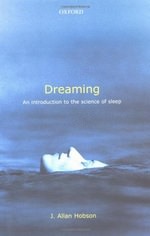Characteristics of Dreams: Dream Research by J Allan Hobson
The five common characteristics of dreams, defined by dream researcher J Allan Hobson. Plus, Hobson's biological theory of dreams and their real meanings.
The characteristics of dreams have long fascinated scientists and philosophers. However it was only relatively recently that dreams came under rigorous scientific analysis. One of the most famous dream researchers is the American psychiatrist, J Allan Hobson, who identified five basic characteristics of dreams in 1988:
- Dreams often feature intense emotions Despite the fact that your waking life may be pretty cushy, it's quite normal to have highly evocative dreams featuring extreme emotions. Whether you dream of intense fear (being chased by a crazed axe murderer) or public humiliation (finding yourself naked on stage). Hobson's dream research found that the three most common dream emotions are anxiety, fear and surprise.
- Dreams are often disorganized and illogical When you dream (non-lucidly) certain parts of your conscious brain are shut off, allowing fantastical thought processes to run wild. The resulting dreams are rife with illogical scenarios and disorganized content, which, upon waking reflection, can make absolutely no sense. J Allan Hobson formally identified that dreams contain "illogical content and organization, in which the unities of time, place and person do not apply, and natural laws are disobeyed".
- Dream content is accepted without question Continuing on this theme, our dreaming minds fully accept the bizarre and illogical characteristics of dreams due to our powerful emotional state. According to Hobson, we create strong emotions and perceptions in the dream world that support what we're experiencing, not matter how strange. When dreaming, we do not have the capacity to reflect logically nor overcome emotions. Unless, of course, you are trained in lucid dreaming.
- Dreams often contain bizarre sensory experiences In dreams, your mind has to "let go" of the experience of lying asleep in bed and submit to a full range of sensations produced internally by the dream world. You may experience the realistic sensation of flying, falling, or even running in slow motion (especially when trying to evade an attacker). Despite these being rare experiences in waking life, they are quite common among dreamers.
- Dreams are often difficult to remember REM sleep is characterized by low levels of serotonin and high levels of acetylcholine, making dreams difficult to store in short term memory. In fact, dream research suggests that 95% of regular dreams are forgotten upon waking. It is possible to improve your dream recall by intensifying your dream experience and making conscious recall a habit. This is always a precursor to practicing lucid dreaming techniques.
Dreams - Transparent or Mysterious?
Through his extensive dream research spanning three decades, Hobson emphasizes the role of neurochemicals in the brain and random electrical impulses originating in the brainstem. He does not say that dreams are purely the random firing of neurons - but rather the brain's cobbled attempt at making sense of them.
He later acknowledged the increased activity of the limbic system (a primeval part of the brain which produces emotions) during REM sleep. This served to give the meaning of dreams an emotional basis, rather than a random neurochemical one.
So, does this provide us with any psychological basis for dream interpretation? Was Sigmund Freud right to suggest that dreams symbolize our repressed fears and desires? Do our dreams contain our darkest secrets just waiting to be unlocked?
Actually, Hobson believes Freud had it wrong. He may even have impeded our scientific understanding of the nature of dreams by propagating such ominous theories. Hobson is all for a psychological meaning to dreams, but just that it needn't be locked away under layers of secretive unconscious meaning.
Instead, Hobson takes a Jungian approach: dreams reveal far more than they hide - and can actually be highly transparent. However, it's difficult to link this conclusion to Hobson's biological explanation for dreaming.
But the theory does make sense. Next time you dream of being chased, isn't it likely that you are - metaphorically - running away from something in real life that's causing you anxiety? And if you dream of being pregnant - for a woman at least - is this a natural expression of your desire to have babies?
With simple interpretive analysis, dreams may not be so mysterious after all...
To learn more about J Allan Hobson's theories of dreaming, check out Dreaming: An Introduction to the Science of Sleep. This book describes how the evolution of dream theory has advanced dramatically over the past 50 years. See how dreams have specific perceptual, cognitive, and emotional qualities that set them apart from waking consciousness (loss of awareness of self, loss of orientation, loss of directed thought, reduction in logical reasoning, and poor memory) that correspond to specific modes of brain activity.

















